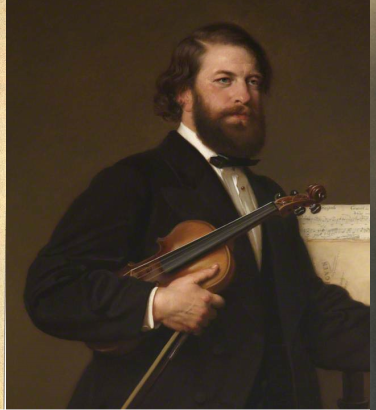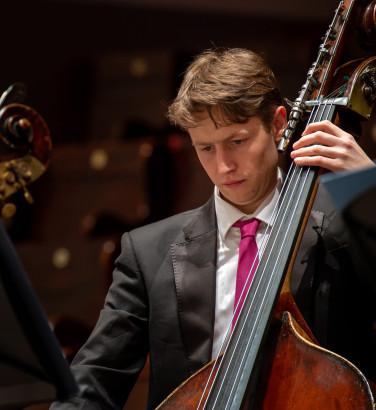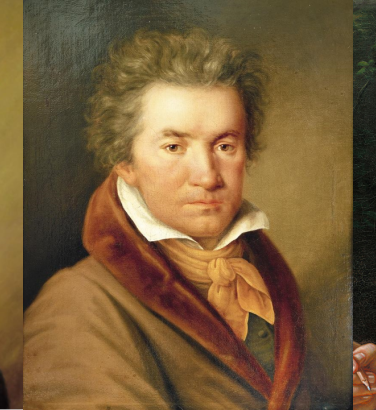
Beyond the Dream: Shakespeare and the Romantics
31 Jan 2023
News Story
Harriet Smithson as Ophelia, in Shakespeare's Hamlet
The musical world seems to have caught the Shakespeare bug surprisingly late. Appreciation for the Bard only took off a full two centuries after his death, but this was very much part of a growing interest in literature during the Romantic age. It coincided with a similar surge of music inspired by the works of Pushkin and Sir Walter Scott.
It’s worth noting that Beethoven, a vitally important figurehead for music in the Romantic era, had toyed with King Lear and Macbeth as potential subjects for operas. As nothing came of these plans, the first recognised masterpiece in terms of Shakespeare-inspired music was the young Mendelssohn’s overture to A midsummer night’s dream (1826). He would write more extensive incidental music to the play - including the ubiquitous Wedding March - in 1842, which together with the original overture forms the second part of the SCO's Mendelssohn concerts in early March.
Coincidentally, Schubert also composed his first two Shakespeare song settings in 1826: An Sylvia and Ständchen. The texts coming from two lesser-known plays - Two Gentlemen of Verona and Cymbeline respectively - may be taken as an indication of how artists were already devouring Shakespeare.
If Mendelssohn’s overture bookends the beginning of the century, its end would be marked by Verdi’s final opera, Falstaff. Premiered in 1893, this formed the culmination of the composer’s interest in Shakespeare – after Macbeth
and Otello – and arguably the high point of his career. Between these two milestones came an enormous number of works inspired by the playwright, from the intimacy of song settings to the grandest of extravaganzas, not even limited to the operatic stage.

Macbeth meets the Witches, in Act III of Verdi's opera: lithograph after Roberto Focosi
Romeo and Juliet, a favourite then as now, proved especially fertile ground for composers: while Prokofiev’s ballet and West side story lay far in the future, the play was the subject of operas by Bellini and Gounod, a symphonic poem by Tchaikovsky (another lifelong Shakespeare obsessive) and a vast ‘dramatic symphony’ by Berlioz.
This last-named composer was also the one most influenced by his reading of Shakespeare. It was following a performance of Hamlet in 1827 that Berlioz developed an obsessive love for the actress Harriet Smithson (playing Ophelia), which would lead him to write Symphonie fantastique three years later. By the time of his death in 1869, he had composed further works inspired by The tempest, King Lear, Hamlet and - deliberately confounding expectations as a dramatic composer - his last major work, the opera Béatrice et Bénédict, based on Much ado about nothing.
The popularity of Shakespeare among composers has hardly let up since: in English-language opera alone, Vaughan William's Sir John in love (its plot taken from The merry wives of Windsor), Britten’s A midsummer night’s dream and Dean’s Hamlet are standouts. That said, it’s heartening to know that it all kicked off with Mendelssohn’s comparatively modest little overture.

The Dream
A feast of Mendelssohn from Maxim: after the irrepressibly sunny Italian symphony, he whisks us away to fairyland for A midsummer night's dream. Expect plenty of enchantment, topped off with the wedding march to end all wedding marches!
Related Stories
![A violinist shown at three different ages: as a young man in a drawing, middle-aged in a painting and elderly in an old photo]()
Joseph Joachim and the great German violin concertos
7 April 2025
Beethoven, Mendelssohn, Bruch and Brahms: four violin concertos, all connected by a single violinist.![]()
The double bass concerto
17 February 2025
We complete our survey of the concerto for stringed instruments with the double bass. It's not just about jazz!![]()
Beethoven's 'lesser' symphonies
27 January 2025
Why are some Beethoven symphonies better-known than others?


